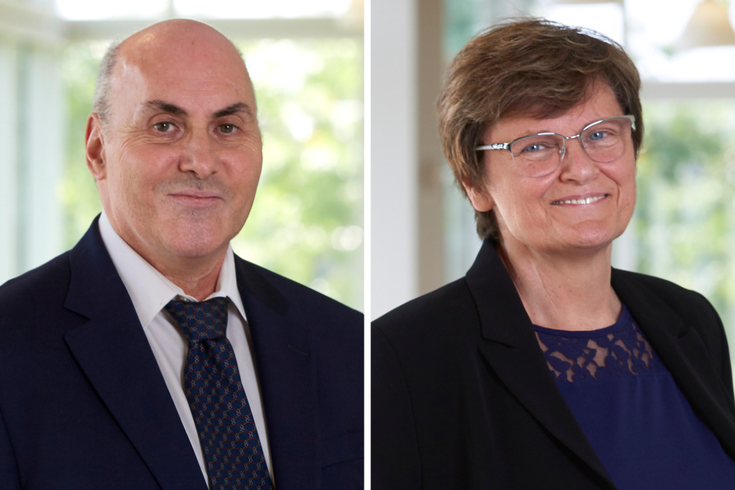
December 06, 2021
 Courtesy of/Penn Medicine
Courtesy of/Penn Medicine
Drew Weissman and Katalin Karikó have been named the 2022 recipients of the Benjamin Franklin Medal in Life Science for their roles in developing the modified mRNA technology used in the COVID-19 vaccines produced by Pfizer-BioNTech and Moderna.
University of Pennsylvania researchers Drew Weissman and Katalin Karikó will be honored by the Franklin Institute in May for their groundbreaking discovery that helped develop the messenger RNA technology utilized in some COVID-19 vaccines.
Weissman and Karikó have been named the 2022 recipients of the Benjamin Franklin Medal in Life Science. The award comes with a $10,000 prize and a 14-karat gold medal.
The researchers are two of 13 honorees who were selected to receive one of the Franklin Institute Awards, which are given out annually for outstanding accomplishments in science, technology, engineering and business.
Other laureates this year include Stéphane Bancel of Moderna, Albert Bourla of Pfizer and Alex Gorsky of Johnson & Johnson. The three CEOs will receive the 2022 Bower Award for Business Leadership for their roles in helping develop each company's respective COVID-19 vaccine. All three men will receive a $250,000 prize and a gold medal.
"These achievements come at a critical time for us all," Franklin Institute President and CEO Larry Dubinski said. "If there is anything the COVID-19 pandemic has taught us — it is that science matters. We are proud to continue the Franklin Institute's longtime tradition of recognizing individuals for their contributions to humanity."
Founded in 1824, the Franklin Institute Awards have honored over 2,000 scientists, engineers and inventors from across the world. Previous winners have included Thomas Edison, Albert Einstein, Nikola Tesla and Jane Goodall.
Weissman is an infectious disease expert and professor of vaccine research at Penn's Perelman School of Medicine. Karikó is an adjunct professor of neurosurgery at the school and a senior vice president at BioNTech.
The two scientists helped engineer modified mRNA technology used in the COVID-19 shots created by Pfizer-BioNTech and Moderna. The synthetic mRNA technology instructs cells to make copies of the coronavirus's spike protein, generating an immune response. The two vaccines have been deployed across the globe to combat the ongoing public health crisis.
Karikó's path to scientific success was far from easy. She had to escape Communist Hungary for the U.S. with her husband and daughter in the 1980s after she had been fired from a research position. Even after arriving at Penn, Karikó struggled to obtain sufficient grant funding for her mRNA research and, at one point, was demoted.
Weissman and Karikó began investigating mRNA technology during the 1990s as a possible therapeutic to prevent infectious diseases.
At first, studies found that synthetic mRNA caused too much inflammation and was destroyed by the body's immune system before it could reach its intended targets. It was not safely and effectively producing strong immune responses.
The body was identifying one of the four molecular building blocks of synthetic mRNA, known as nucleosides, as an intruder. To fix this, the scientists altered the problematic nucleoside in a way that allowed synthetic mRNA to slip by the body's defense system.
In 2005, Weissman and Karikó published this research, demonstrating that mRNA technology could be modified to serve as a therapeutic for infectious diseases and effectively reach its intended targets.
Researchers are hopeful that mRNA technology may be used for future vaccines and treatments for pathogens such as malaria, HIV, cancer and influenza, as well as a wide range of coronaviruses.
Weissman and Karikó were awarded the $3 million Breakthrough Prize in Life Sciences, the world's largest in the field of science, in September.
Both scientists also recently have been honored with the Princess of Asturias Award and the Albany Medical Center Prize in Medicine and Biomedical Research.
Follow Pat & PhillyVoice on Twitter: @Pat_Ralph | @thePhillyVoice
Like us on Facebook: PhillyVoice
Add Pat's RSS feed to your feed reader
Have a news tip? Let us know.